 Petzlover
Petzlover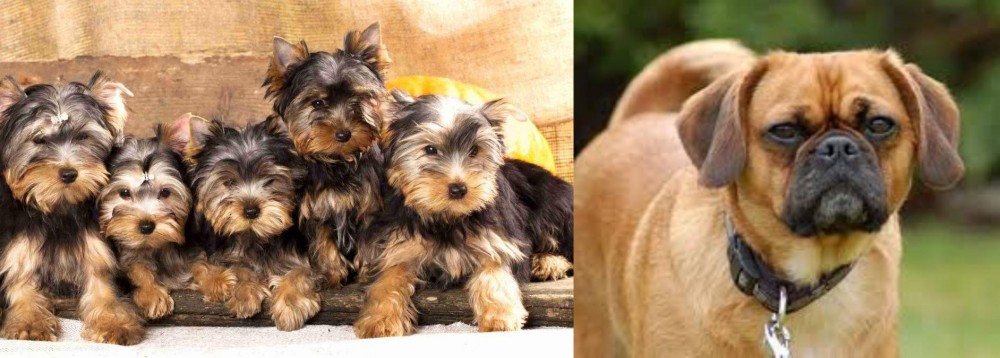 Yorkshire Terrier is originated from United Kingdom but Pugalier is originated from United States. Yorkshire Terrier may grow 12 cm / 4 inches shorter than Pugalier. Yorkshire Terrier may weigh 7 kg / 15 pounds lesser than Pugalier. Both Yorkshire Terrier and Pugalier has same life span. Both Yorkshire Terrier and Pugalier has almost same litter size. Yorkshire Terrier requires High Maintenance. But Pugalier requires Low Maintenance
Yorkshire Terrier is originated from United Kingdom but Pugalier is originated from United States. Yorkshire Terrier may grow 12 cm / 4 inches shorter than Pugalier. Yorkshire Terrier may weigh 7 kg / 15 pounds lesser than Pugalier. Both Yorkshire Terrier and Pugalier has same life span. Both Yorkshire Terrier and Pugalier has almost same litter size. Yorkshire Terrier requires High Maintenance. But Pugalier requires Low Maintenance
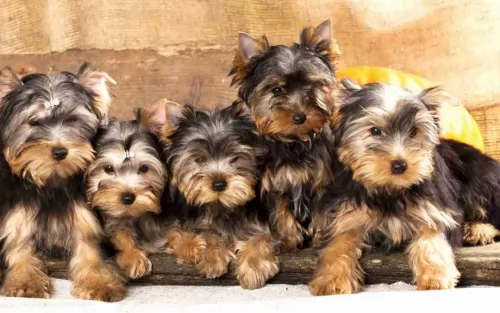 The Yorkshire terrier originated in Yorkshire which is a place in northern England. In mid 19th century workers from Scotland came to Yorkshire in search for work. They brought different varieties of small terriers with them. Earlier they are known as Broken Haired Scotch Terrier and then Toy Terrier. In 1874 they were officially named as Yorkshire Terrier. They begun their journey as hunting dogs and later developed as companion dogs. AKC registered the breed in 1878.
The Yorkshire terrier originated in Yorkshire which is a place in northern England. In mid 19th century workers from Scotland came to Yorkshire in search for work. They brought different varieties of small terriers with them. Earlier they are known as Broken Haired Scotch Terrier and then Toy Terrier. In 1874 they were officially named as Yorkshire Terrier. They begun their journey as hunting dogs and later developed as companion dogs. AKC registered the breed in 1878.
 The Pugalier is a designer dog which dates to the 1980s and 1990s. Being a fairly new dog breed, it doesn’t have a long or detailed history.
The Pugalier is a designer dog which dates to the 1980s and 1990s. Being a fairly new dog breed, it doesn’t have a long or detailed history.
It is thought that they were first bred in the United States. There was a purpose behind the crossing of the Pug and the Cavalier King Charles Spaniel. Dog enthusiasts were looking for a dog that would have less breathing problems with a longer nose.
There are a few dog breed registries that recognize the Pugalier as a designer dog breed, one of which is the American Canine Hybrid Club.
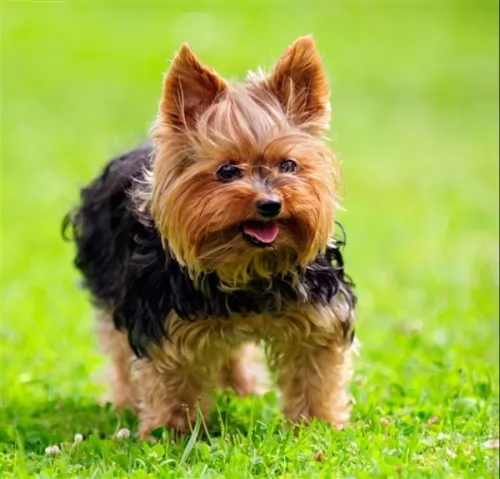 Yorkshire terriers are one of the glamorous member of the dog breeds. They have excellent personality as their owner will be surely proud of them when taking them in public. They like to go outside and make adventures. They are good companion dogs and watch dogs too. They are very affectionate with their owners. Yorkies always bark when any stranger comes and they should be taught about neighbours and when to bark. They will get angry on seeing new dogs and surely chases squirrels.
Yorkshire terriers are one of the glamorous member of the dog breeds. They have excellent personality as their owner will be surely proud of them when taking them in public. They like to go outside and make adventures. They are good companion dogs and watch dogs too. They are very affectionate with their owners. Yorkies always bark when any stranger comes and they should be taught about neighbours and when to bark. They will get angry on seeing new dogs and surely chases squirrels.
They like to spend more time with their people. Leaving them alone for long time is not good. Yorkshire terrier should be treated gently and with love. They love to spend time with older children. They love apartment life if they are made to play and walk daily. Yorkies are the second most popular dog in America.
 The Pugalier looks fairly similar to a pug but with a slightly longer nose and longer ears. The tail isn’t as coifed as with the Pug, but is longer and straighter, sometimes curling slightly over the back.
The Pugalier looks fairly similar to a pug but with a slightly longer nose and longer ears. The tail isn’t as coifed as with the Pug, but is longer and straighter, sometimes curling slightly over the back.
As with any crossbreed, the dog’s appearance can vary between the two dogs. They can be small to medium sized, usually standing at between 30 and 35cm in height and weigh between 6-10kg.
Pugaliers mostly have a fairly short coat but there are some which have longer hair because of the Cavalier's influence. The coat can be an apricot color, white, brown or even tri-color - white, black & tan.
Friendly, social ad loving, the Pugalier makes a splendid pet. He will easily adapt to life in the city or the countryside and he also gets along well with children and other dogs. They can also be amusing and entertaining, while being intelligent too.
You’ll find your Pugalier easy to train as he is intelligent and then he becomes a splendid pet with training and socialization, being obedient and well mannered wherever he is.
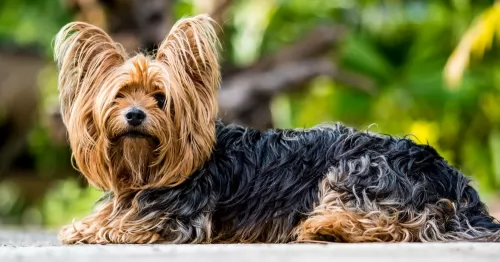 Yorkshire terrier are not so much friendly with children. It is not advised to leave them with children without adult supervision.
Yorkshire terrier are not so much friendly with children. It is not advised to leave them with children without adult supervision.
They were previously used to catch rats and hunt badger and fox. They are excellent watchdogs and defend their territory very well.
They adapts well for apartment living. But they will not be happy if leaved alone for a long time. Yorkies cannot tolerate too hot or cold weather.
They are moderately easy to train. Yorkshire terrier should be trained early when they are amenable to process. Sessions should be conducted with lots of treats and must be short as they will easily get bored.
 The Pugalier gets his characteristics from both the popular parent breeds he comes from – the Pug and the Cavalier King Charles Spaniel.
The Pugalier gets his characteristics from both the popular parent breeds he comes from – the Pug and the Cavalier King Charles Spaniel.
Both these dog breeds are immensely popular, friendly, loving and amusingly entertaining. He is an excellent dog choice for the first time dog owner.
The Pugalier is an intelligent dog breed and easy to train too. When you bring such a sweet dog into your home, you open the doors to a deep, meaningful friendship and loyalty from your canine pet.
 Less wrinkles and a longer snout make the Pugalier a healthier dog than the purebred Pug. The dog, when well cared for, can still reach a good age of 14 or so years.
Less wrinkles and a longer snout make the Pugalier a healthier dog than the purebred Pug. The dog, when well cared for, can still reach a good age of 14 or so years.
Eye problems can still be a problem as both the Pug and the Cavalier have protruding eyes.
Patellar Luxation is another health issue to watch for. The patella or the kneecap is dislocated and the dog will have difficulty with putting weight on the leg. Your vet may perform surgery on your dog and the prognosis is very good if arthritis hasn’t already developed.
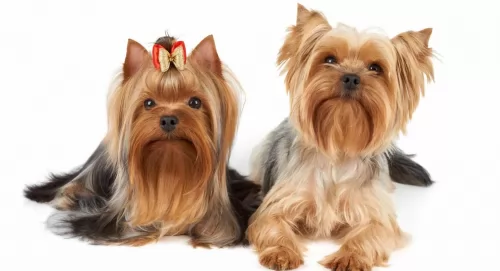 For English bull dog puppies, When you change the puppy food from liquid to solid initially you must give what the dam is having. This is to avoid digestive problems when new food is introduced. The level of liquid food should be reduced in a step by step manner and thus increasing solid food gradually.
For English bull dog puppies, When you change the puppy food from liquid to solid initially you must give what the dam is having. This is to avoid digestive problems when new food is introduced. The level of liquid food should be reduced in a step by step manner and thus increasing solid food gradually.
You have two choices and one is manufactured dog food and another is home cooked food. Commercial brands are not suggested as they contain artificial coloring and chemical preservatives.
Vaccinations should be made at the right time. The food given should be the best.
Yorkshire terrier should be taught tricks by giving rewards. Exercising them has benefits such as maintaining muscles, release pent-up energy, good for heart, good metabolism, good sleep and be active.
 Your Pugalier will require daily exercise, and he will just love a walk. The Pug part of him will tell you to go slowly with exercise and to ensure it isn’t too strenuous.
Your Pugalier will require daily exercise, and he will just love a walk. The Pug part of him will tell you to go slowly with exercise and to ensure it isn’t too strenuous.
The Spaniel part of him will love a robust ball game or running backwards and forwards between two people throwing a frisbee. Watch the Pugalier during exercise and don’t allow him to get overly hot and bothered.
Pugaliers do shed hair and you will need to brush him twice a week. Check his eyes and inside his ears and make sure all is as it should be.
Trim his nails and look inside his mouth for bad teeth. Dog’s can’t tell you they’re in pain and bad teeth can cause terrible pain and a lot of health issues throughout the entire body.
Every dog needs an excellent diet if he is to ward off illness and live a long life.
There are some excellent commercially manufactured dog foods on the market so read the packaging carefully and avoid those ones with low quality ingredients like colorants, lots of preservatives and fillers.
High quality dry kibble can be made more inviting when you add in some home-cooked food twice a week. Boiled chicken, sweet potatoes, brown rice or pasta, carrots and spinach will be excellent for him – it is simple and nutritious.
Chop the food up finely and add it into the dry kibble. Also, your little pet will thrive on some raw meat occasionally too as this keeps the coat shiny and and the skin free of infections. Make sure he is never without a constant supply of fresh, cool water.